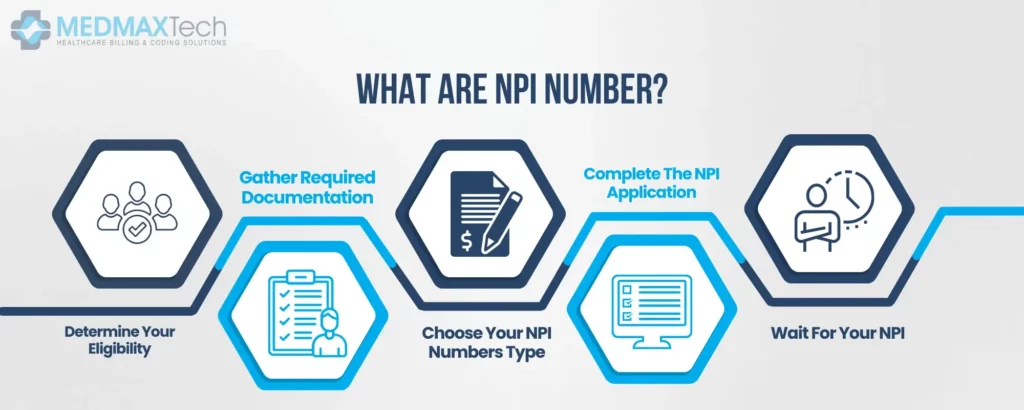
What Are NPI Number? A Brief Guide
A National Provider Identifier (NPI Numbers) is a unique identification number issued by the Centers for Medicare and Medicaid Services (CMS) to healthcare providers in the United States. The NPI is used to identify healthcare providers in electronic transactions, such as when submitting claims for reimbursement or checking the status of a claim.
If you are a healthcare provider in the United States, you will need to apply for an NPI if you want to participate in the Medicare program or other federal healthcare programs. Here is a step-by-step guide on how to apply for an NPI:
1. Determine Your Eligibility:
To be eligible for an NPI, you must be a healthcare provider who delivers healthcare services in the United States. This includes doctors, nurses, dentists, chiropractors, and other types of healthcare providers.
2. Gather Required Documentation:
To apply for NPI numbers, you will need to provide certain documentation. This may include your state license or certification, proof of insurance, and any other relevant documents.
3. Choose Your NPI Numbers Type:
- There are two types of NPIs: individual NPIs and organizational NPIs. Individual NPIs are assigned to individual healthcare providers, while organizational NPIs are assigned to organizations or groups of healthcare providers. Choose the type of NPI that best fits your needs.
4. Complete The NPI Application:
You can apply for NPI numbers online or by mail. To apply online, visit the National Plan and Provider Enumeration System (NPPES) website and create an account. You will then be able to fill out the NPI application and submit it electronically. To apply by mail, download the NPI application form from the NPPES website and mail it to the address provided on the form.
5. Wait For Your NPI:
- It may take several weeks for your NPI to be processed and issued. You will receive a confirmation letter in the mail once your NPI has been issued.
It is important to note that you must use your NPI on all claims submitted to Medicare and other federal healthcare programs. Failure to do so may result in the rejection of your claims.
By following these steps, you can successfully apply for an NPI and use it to participate in the Medicare program and other federal healthcare programs.
A National Provider Identifier (NPI) is a unique identification number assigned to healthcare providers in the United States. There are two types of NPIs: individual NPIs and group NPIs. An individual NPI is assigned to a specific individual healthcare provider, such as a doctor or nurse. A group NPI, on the other hand, is assigned to a group of healthcare providers who work together as a team, such as a medical practice or clinic. The main difference between the two is that the individual NPI is specific to one individual, while the group NPI is used to identify the group as a whole. Both types of NPIs are used to identify healthcare providers and facilitate the electronic exchange of healthcare information.
How to Apply for NPI numbers?
To apply for a National Provider Identifier (NPI) number, you will need to complete an NPI application and submit it to the National Plan and Provider Enumeration System (NPPES). The NPPES is the database that maintains all NPIs and is managed by the Centers for Medicare and Medicaid Services (CMS).
To apply for an NPI, you will need to provide information about yourself or your healthcare organization, including your name, address, and the type of healthcare services you provide. You will also need to provide documentation to verify your identity and your credentials as a healthcare provider.
To complete the application process, you will need to pay a fee and provide a valid email address. Once your application has been reviewed and approved, you will be assigned an NPI number. You can use this number to identify yourself or your organization as a healthcare provider in electronic transactions, such as submitting claims to insurance companies.
Billing Under Group NPI vs Individual NPI
Billing under a group National Provider Identifier (NPI) versus an individual NPI may affect how healthcare services are reimbursed.
When billing under a group NPI, the billing provider is the group, rather than an individual provider. The group NPI is used to identify the group as a whole, rather than a specific individual within the group. In this case, the group may bill for the services provided by any member of the group.
On the other hand, when billing under an individual NPI, the billing provider is a specific individual within the group. The individual NPI is used to identify that specific provider, and the provider is responsible for billing for their own services.
It is important to note that the type of NPI used for billing may affect the reimbursement rate for the services provided. Some payers may have different reimbursement policies for services billed under a group NPI versus an individual NPI. It is recommended to check with the payer or consult with a healthcare billing specialist to determine the appropriate NPI to use for billing.










